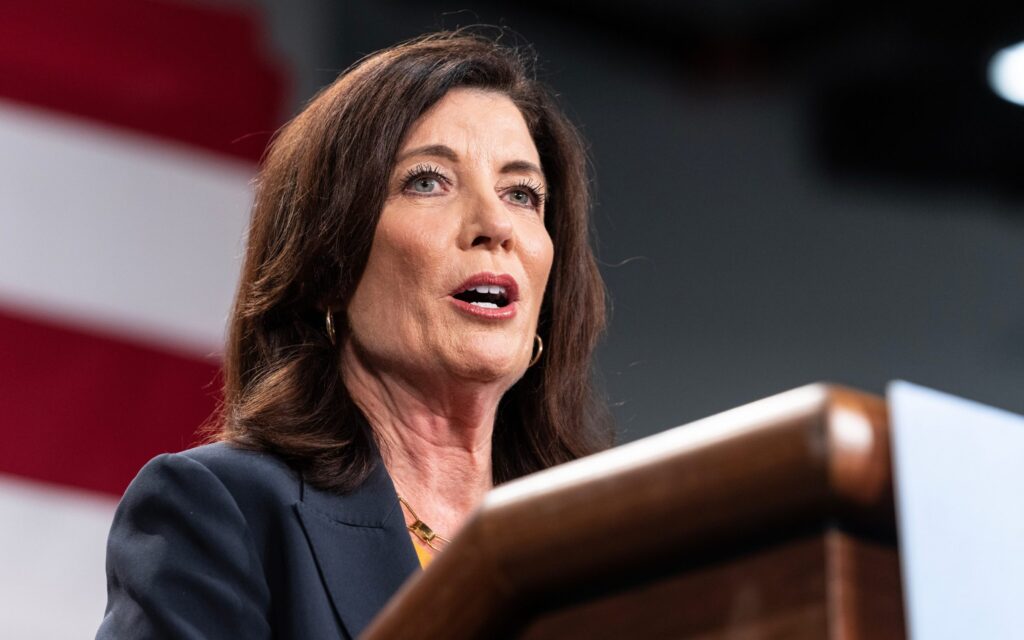New York Governor Kathy Hochul on Wednesday signed legislation to reign in the state’s illicit marijuana market that includes penalties for unlicensed cannabis retailers of up to $20,000 per day. The legislation, which increases civil and tax penalties for the illicit sale of cannabis in New York, was signed into law as part of the state budget for the 2024 fiscal year.
Hochul first proposed the new measures to address New York’s underground cannabis market in March as a way to prop up the emerging industry for recreational marijuana, which was legalized by state lawmakers in 2021. Regulated sales of adult-use cannabis began in the closing days of 2022, but so far, only a handful of licensed dispensaries have opened statewide. Meanwhile, free from the threat of criminal penalties, unlicensed dispensaries have proliferated, with a law enforcement task force study conducted earlier this year identifying at least 1,200 illicit pot shops in New York City.
“As New York State continues to roll out a nation-leading model to establish its cannabis industry, these critical enforcement measures will protect New Yorkers from illicit, unregulated sales,” Hochul said in a statement on May 3. “Unlicensed dispensaries violate our laws, put public health at risk, and undermine the legal cannabis market. With these enforcement tools, we’re paving the way for safer products, reinvestment in communities that endured years of disproportionate enforcement, and greater opportunities for New Yorkers.”
Law Gives New Enforcement Powers
The new legislation provides additional enforcement power to the New York Office of Cannabis Management (OCM) and the state Department of Taxation and Finance (DTF) to enforce regulatory requirements and close stores engaged in the illegal sale of cannabis. The new law allows the OCM to assess civil penalties against unlicensed cannabis businesses, with the “most egregious” illicit operators facing fines of up to $20,000 per day. The law also makes it a crime to sell cannabis or cannabis products without a license.
The legislation also gives the OCM new powers to conduct regulatory inspections of businesses selling cannabis and cannabis products, including so-called gifting shops that provide cannabis in return for inconsequential merchandise. The agency will have the power to seize untested cannabis products from unlicensed businesses and will seek court orders to close unlicensed shops and evict commercial tenants engaged in selling cannabis without a license.
Additionally, the DTF is now empowered to conduct regulatory inspections of businesses selling cannabis to determine if the appropriate taxes have been paid and levy civil penalties on businesses not paying taxes. The legislation also establishes a new tax fraud crime for businesses that willfully fail to collect or remit required cannabis taxes, or knowingly possess for sale any cannabis on which tax was required to be paid but was not.
“Strengthening tax laws as they pertain to the cannabis industry and providing for robust and fair enforcement will help the industry to be successful over the long term,” said New York State Acting Commissioner of Taxation and Finance Amanda Hiller.
Elliot Choi, counsel and chief knowledge officer at the cannabis and psychedelics law firm Vicente LLP, said that while the new measures passed into law are good news for the regulated cannabis industry, some of the governor’s measures will likely not have an immediate effect on illicit operators.
“Illegal dispensaries continue to proliferate in New York, especially in the City, so any movement on enforcement is welcome,” Choi wrote in an email to High Times. “The enforcement legislation in the state’s budget includes the ability for the Department of Tax and Finance to levy some hefty fines. We suspect those fines will have a deterrent effect on new illegal dispensaries. However, the tax department is going to need time to staff up and the Office of Cannabis Management will need to draft some regulations before there is a crackdown on existing ones.”
Hochul’s efforts to protect licensed cannabis retailers also include measures to lessen the demand for illicit marijuana. Last month, she unveiled a consumer ad campaign to encourage consumers to purchase cannabis from licensed dispensaries.
H/T: www.hightimes.com






